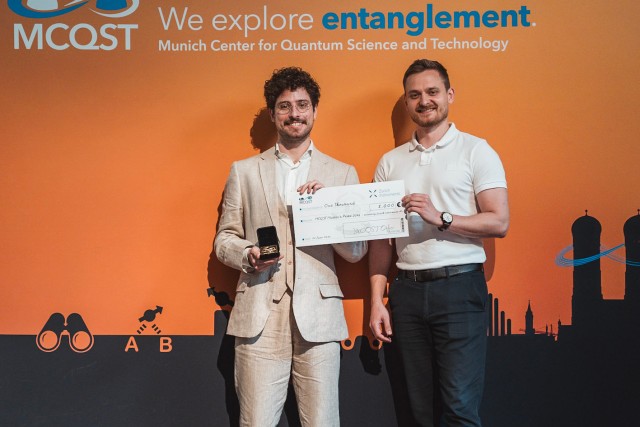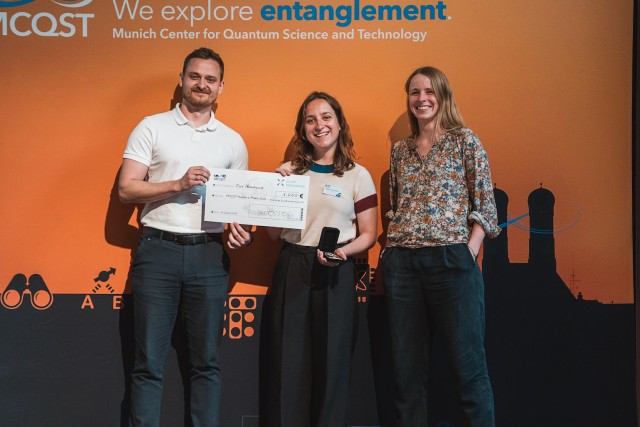7 July 2025
Jacopo De Santis and Anka Van de Walle win the MCQST 2024 Master’s Awards
The MCQST Master's Award recognizes two exceptional Master's theses from the MCQST community, each year. This prestigious prize serves to acknowledge and celebrate outstanding research projects undertaken by talented Master's students, with the intention of inspiring and motivating the awardees to pursue successful careers in the field of science.
From the submitted theses, the jury selected and awarded two outstanding works in 2024: "Design and Characterization of a High-finesse Optical Resonator for Cavity-assisted Readout of Atomic Arrays" by Jacopo De Santis and "Solving the Time-dependent Schrödinger Equation with Neural Quantum States" by Anka Van de Walle. Alongside the recognition of their excellent contribution to the MCQST scientific community, the award consist of €1000 each, generously donated by Zurich Instruments.
The award ceremony took place during the Munich Conference on Quantum Science and Technology 2025 in Kufstein on Friday, 6 June, where the Master's Award was celebrated for the third time.

Jacopo De Santis
Design and Characterization of a High-finesse Optical Resonator for Cavity-assisted Readout of Atomic Arrays
MPQ | Supervisor: Johannes Zeiher
In his thesis Jacopo designed and realized a high-finesse optical resonator for readout of atomic arrays at the SNAQC lab at MPQ.
Optical resonators, commonly known as optical cavities, are devices capable of trapping and confining light in small mode volumes and are ideal for engineering atom-light interactions. Due to the confinement of light, an atom placed inside a cavity will experience a larger local density of photonic states resulting in an enhancement of its spontaneous emission rate into the cavity mode. This phenomenon is called the Purcell effect. In recent years, strong interest has grown towards the possibility of taking advantage of this Purcell enhancement for improving atomic state readout with experiments showing promising results in the development of cavity based mid-circuit measurements for neutral atom quantum computers.
To design the optical resonator, Jacopo followed the principle of simplicity. In fact, the higher the passive stability of the system, the lower the risk of failure of this highly delicate component. Moreover, he took particular attention to the constraints arising from integrating such a device in a Rydberg atoms array experiment: from allowing optical access for atom trapping and manipulation to electric field shielding for Rydberg compatibility.
In the last part of his work, Jacopo realized a setup for assembling and characterizing the optical resonators resulting from his design and used it to build a test cavity with a Purcell enhancement factor of 7.
"Having been part of the MCQST community for more than 3 years now, I am deeply honoured to see the quality of my contribution being recognized with this award. However, building an experiment is a group effort and this would not have been possible without the support of my colleagues Balázs, Mehmet, Sebastian and Pranav, the supervision and advice from Prof. Zeiher and the contribution of all the staff at MPQ (from our mechanical and electrical engineers to the people working in our workshop)."
What's next for Jacopo?
Since after the defence of his Master's thesis in January 2024, Jacopo continued as an IMPRS-fellow PhD student in the SNAQC lab. He is now trying with his colleagues to finalize the set up of the experimental machine and finally use the cavity he designed as a master student to perform mid-circuit measurements in neutral atom quantum computers and study the implementation of quantum error correcting codes. He is confident that this is just the first of many successful results coming out of the SNAQC lab!
Anka Van de Walle

Solving the Time-dependent Schrödinger Equation with Neural Quantum States
LMU München | Supervisor: Annebelle Bohrdt
Anka’s Master's thesis focused on developing a new method for numerically simulating quantum dynamics in two-dimensional spin systems using neural networks, called time-dependent Neural Quantum States (t-NQS). Neural networks can represent quantum wave functions as a variational ansatz, where the training consists of optimizing the variational parameters to conform the time-dependent Schrödinger equation (TDSE). Unlike traditional approaches that evolve the wavefunction step-by-step in time, t-NQS models the full time evolution globally by treating time as an input to a transformer-based neural network and solving the TDSE as a global optimization problem. This allows the model to learn temporal and spatial correlations simultaneously, enabling efficient simulation of large systems and long-time dynamics. The method sidesteps the need for numerical integration schemes and can incorporate time-dependent Hamiltonians directly. Of interest in both theoretical studies of open-system dynamics and practical quantum simulation platforms, t-NQS provides a scalable and flexible framework for exploring real-time evolution in strongly correlated systems. In short, the thesis introduces and benchmarks this new architecture, highlights its advantages over standard variational dynamics methods, and explores its performance across different interaction strengths and system sizes.
"I feel very honored to have received the MCQST Master's Award. Working on my thesis was an incredibly rewarding experience — I met inspiring people, learned what it means to be part of a scientific community, and discovered how much your environment shapes your research. I'm especially grateful to my supervisor and PhD group for their support and the many opportunities they gave me to grow. It’s very special to end this chapter with such a meaningful celebration of all the work."
What's next for Anka?
At the beginning of 2025, Anka started her PhD in a joint position, working with Prof. Frank Verstraete at Ghent University and Prof. Annabelle Bohrdt at LMU Munich. This collaboration allows her to continue exploring neural quantum states, now with a focus on symmetries and dualities and the description of fermionic systems. She is happy to remain so closely connected to Munich while embarking on this new chapter.
Congratulations to Jacopo and Anka, and all the best for their future!